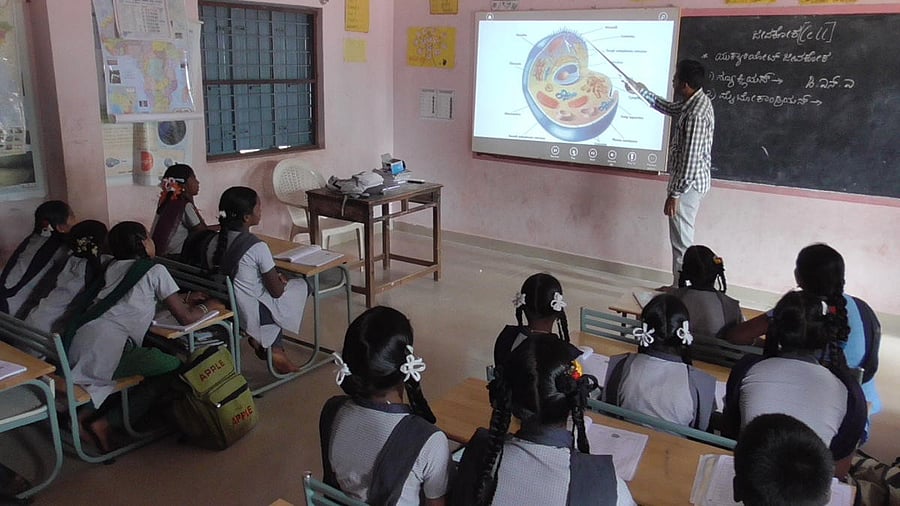
Representative image of a classroom in a school.
Credit: DH File Photo
Chennai: From a strong foundation in numeracy and literacy at the primary level to strong academic rigour to help students choose career pathways at the secondary and higher secondary levels – the school curriculum in Tamil Nadu will undergo a major redesign and rationalization under the State Education Policy (SEP).
The SEP, which was released in August this year after about two years of consultations, is the DMK’s dispensation’s answer to the National Education Policy (NEP) 2020 which according to it is nothing but a tool to “impose” Hindi on non-Hindi speaking states.
The SEP, the first-of-its kind, has reiterated that Tamil Nadu will continue to follow the two-language policy of Tamil and English, and has vowed not to allow regressive thoughts in education. The policy bats for doing away with board exams for plus-one to reduce the burden on the students and to give them time to prepare for the plus-two exams.
The government has now constituted two committees – a high-level expert committee headed by School Education Minister Anbil Mahesh and a curriculum design committee under State Planning Commission member and renowned academic Sultan Ahmed Ismail, to revamp the school curriculum, an exercise being conducted after eight years.
The first meeting of the high-level expert committee will be held on November 24, kickstarting the whole process of revamping the curriculum and beginning the process of implementing the SEP.
“A lot of ground work has already been done by the SCERT which will be used as a base by the committee while drafting the new syllabus. We hope that in the 2027-2028 academic year, children from class one to eight will be able to step into the new curriculum,” B Chandra Mohan, Principal Secretary (School Education), told DH.
The curriculum will be aligned with the goals set by the SEP like integrating future skills like critical thinking, creativity, digital literacy, financial literacy, climate education, health, safety awareness and most importantly, the much-needed focus on value education and life skills.
“The entire content of the curriculum will be local heritage, traditional knowledge systems which basically will give the roots which will define the ability of the student to harness the latest advances in technology and science especially stem curriculum,” Chandra Mohan added.
The bureaucrat said the curriculum will be drafted in a way that it focuses on a strong foundation in numeracy and literacy for primary school (classes 1 to 5) students, strong academic rigour for helping students choose career pathway and successful navigation for secondary and higher secondary (classes 9 to 12), and transition and bridge between strong foundation and academic rigour for middle school (classes 6 to 8).
The curriculum will be designed in a way that the child first learns about his immediate surroundings and neighbourhood before becoming aware of what the larger administrative and social contexts are.
“He will in those days learn about his traditions, his festivals, his lifestyle, and the lived reality. And after that slowly his horizons as he grows up will be expanded to the district, state, and the country,” he added.
The syllabus will also be made dynamic as the books will be updated every year before they go for print. Chandra Mohan said the committee will be guided by the State Education Policy and the curriculum framework that has been laid down by the SEP.